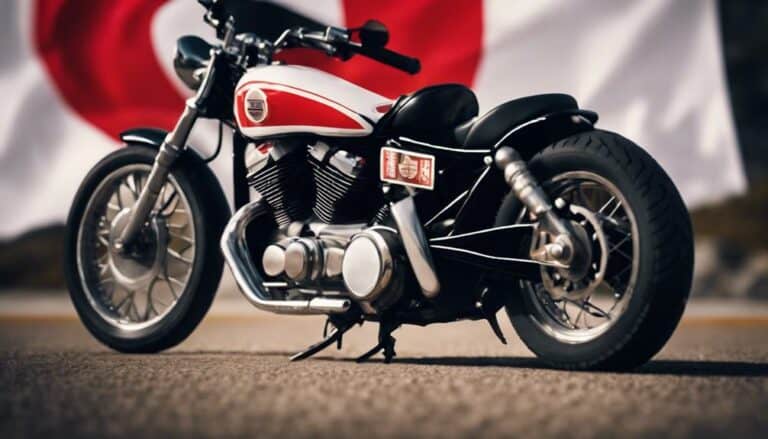You might be surprised to learn that a well-known Japanese company acquired Harley-Davidson.
The deal, shrouded in secrecy until recently, has sparked debates and speculations within the automotive industry.
The implications of this unexpected acquisition are far-reaching, especially considering the rich history and cultural significance attached to the Harley-Davidson brand.
As details continue to emerge, the future direction of this iconic American motorcycle manufacturer remains uncertain, leaving enthusiasts and experts alike eager to uncover the full story behind this intriguing takeover.
Key Takeaways
- Acquisition by a different Japanese firm led to ownership transfer of Harley Davidson brand.
- Historical collaboration with Sankyo Co. in Japan influenced Harley's market presence.
- Potential focus on reviving connections with Type 97 motorcycle for brand innovation.
- Industry speculation on integration of Japanese expertise with Harley's iconic engine technology.
Background of Harley-Davidson Company
The history of the Harley-Davidson Company dates back to the early 20th century, tracing its origins to the innovative minds of William S. Harley and Arthur Davidson.
One interesting aspect of the company's history is its connection to the Japanese Army. Baron Kishichuro Okura, the first unofficial importer of Harley-Davidsons to Japan, played a crucial role in introducing these iconic motorcycles to the country. However, Harley-Davidson faced challenges with spare parts availability in Japan, prompting the need for intervention.
This led to Alfred Rich Child being sent to Japan in 1924 to address these challenges. Subsequently, the Harley Davidson Motorcycle Sales Company of Japan was established in the same year. To overcome the spare parts issue, the Japanese company Sankyo Co. provided investment capital for an exclusive manufacturing rights deal with Harley-Davidson.
This partnership not only ensured the availability of spare parts but also laid the foundation for a successful presence of Harley-Davidson in Japan.
Acquisition by a Japanese Firm
Amidst its historical collaboration with Sankyo Co. in Japan, Harley-Davidson found itself in a significant turn of events with its acquisition by a Japanese firm. This acquisition marked a pivotal moment in the history of the iconic Harley Davidson Motorcycle company. While Sankyo Co. had previously been involved in exclusive manufacturing rights deals with Harley-Davidson, the acquisition by a different Japanese firm signaled a new chapter for the renowned motorcycle manufacturer.
The agreement with this Japanese firm granted them ownership of Harley-Davidson, including its brand, manufacturing facilities, and intellectual property. This move brought together two significant players in the motorcycle industry, combining expertise and resources to potentially drive innovation and growth in the market. As Harley-Davidson transitions under new ownership, it will be interesting to observe how this acquisition shapes the future of the company and its iconic motorcycles.
Impact on Harley-Davidson Brand
Influencing the perception and market position of Harley-Davidson, the recent acquisition by a Japanese firm has sparked discussions about the future direction of the iconic motorcycle brand. This acquisition has deep implications for Harley-Davidson's brand image and legacy.
Consider these points:
- The historical association with the Type 97 motorcycle, manufactured under the collaboration with Sankyo Co., adds a layer of complexity to Harley-Davidson's narrative.
- The Type 97 motorcycle, branded as Rikuo, has a storied past, including its popularity during World War II and its features tailored for military use.
- The production of over 18,000 Type 97 motorcycles as part of the exclusive manufacturing rights deal with Sankyo significantly impacted the Harley-Davidson brand's history.
These factors contribute to a nuanced understanding of how the recent acquisition by a Japanese firm may influence the perception of Harley-Davidson among enthusiasts and the broader market.
Future Plans and Strategies
Considering the recent acquisition by a Japanese firm, the future plans and strategies of Harley-Davidson are poised to undergo significant shifts in response to this new ownership.
With the history of Sankyo Co. holding exclusive manufacturing rights for the Type 97 motorcycle during World War II, particularly the Rikuo model, there's potential for a strategic focus on reviving this historical connection. Harley-Davidson could leverage this heritage to create a niche market for vintage-inspired motorcycles or even explore collaborations that pay homage to the Rikuo design.
Furthermore, the investment made by Sankyo in rebuilding a plant near Tokyo showcases a commitment to production capabilities, hinting at the possibility of joint ventures or expanded manufacturing operations in Japan.
Industry Reaction and Speculation
The recent acquisition of Harley-Davidson by a Japanese firm has sparked intense reactions and speculative discussions within the motorcycle industry. Industry experts and enthusiasts are closely monitoring the implications of this unexpected development, particularly in regard to the iconic Harley engine.
Analysts are evaluating how the integration of Japanese engineering expertise with the legendary Harley engine technology might influence future motorcycle designs.
Enthusiasts are debating whether the traditional rumble and power associated with Harley engines will remain intact under the new ownership.
Competitors within the industry are strategizing on how to respond to the potential shift in the market dynamics resulting from this acquisition.
The collaboration between Sankyo Co. and Harley-Davidson in the past, particularly in the production of Rikuo motorcycles during World War II, adds a historical context to the current acquisition. The industry's reaction and speculation reflect a mix of curiosity, apprehension, and eagerness to witness the evolution of Harley-Davidson motorcycles under Japanese ownership.
Conclusion
You have learned about the acquisition of Harley-Davidson by a Japanese firm, which had a significant impact on the brand's history.
Interestingly, the Japanese-built Rikuo model, based on Harley-Davidson designs, gained popularity during its time, especially with the Japanese military.
This partnership marked a key milestone in the global expansion and influence of Harley-Davidson in the motorcycle industry.

